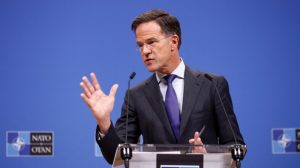Shigeru Ishiba’s election as Japan’s next leader expected to rattle stock market
Unlock the Editor’s Digest for free
Roula Khalaf, Editor of the FT, selects her favourite stories in this weekly newsletter.
Shigeru Ishiba’s election as leader of Japan’s ruling Liberal Democratic party is expected to put pressure on the country’s stocks on Monday morning after Nikkei 225 futures fell 6 per cent following his victory this week.
Ishiba, a former defence and agriculture minister who is set to take over as prime minister on October 1, is a China hawk who has vowed to prevent the nation from falling back into deflation.
The new LDP leader has said he supports the Bank of Japan’s plan to normalise monetary policy, but investors are concerned about his support for heavier taxes on companies and investment income.
Before the winner of the leadership race was announced on Friday, Japan’s Nikkei 225 index had rallied 2.3 per cent and the yen had fallen, suggesting the market was positioned for a win by economic security minister Sanae Takaichi. Takaichi supported stock market-friendly “Abenomics” policies of ultra-low interest rates and fiscal stimulus.
Nikkei 225 futures traded in Chicago fell sharply after the LDP election result announcement.
“The futures market tells us it’s going to be very ugly on Monday. Normally you would look to buy the dip, but on this occasion you would probably want to wait a bit for everything to adjust,” said a trader at one of Japan’s largest investment banks.
“As more had expected Takaichi to win, the yen has been weakening as she had clearly expressed she will not support further rate hikes by the BoJ,” said Ryota Abe, an economist in the Asia-Pacific division of Sumitomo Mitsui Banking Corporation (SMBC).
The yen rebounded moments after Ishiba was announced as the winner and went into the weekend at about ¥142 against the US dollar. SMBC’s Abe predicted the yen would move in a ¥140-¥145 range after Ishiba’s win.
“Expectations for political pressures on BoJ’s future decisions are likely gone. There should be no hurdles for BoJ to deliver additional rate hikes going forward,” he added.
Masatoshi Kikuchi, chief equity strategist at Mizuho Securities, warned investors that Ishiba’s victory was likely to trigger a reversal of the pre-election rally in the Nikkei 225 index.
Kikuchi noted that going into the election foreign investor confidence in Japan had been fragile as a result of uncertainties about the country’s political direction. In the second week of September, when campaigning for the LDP leadership began, foreign investors were net sellers of ¥1.5tn ($10.6bn) in the cash equities market — their largest week of selling Japanese stocks since 1982, according to Kikuchi.
Some investors are concerned about Ishiba’s desire to raise taxes on both companies and income from privately held financial assets, though he clarified that he would not raise taxes on Japan’s new NISA tax-free investment accounts or individual defined-contribution pension plans.
Any attempt to raise taxes on companies and investors could potentially generate major pushback and hit the new prime minister’s credibility if he were forced into a rapid compromise, equity strategists said.
“Near-term price volatility is likely to persist until Mr Ishiba can clarify his stance on areas of investor concern such as corporate governance reform and tax rates on financial asset income,” said Goldman Sachs analysts in a note.
Investors are already on the hunt for buying opportunities and compiling a basket of stocks considered likely to benefit from an Ishiba administration, including those involved in defence and disaster relief. The 67-year-old has advocated establishment of a disaster management agency in the country, which is often hit by earthquakes, typhoons and flooding.
Within hours of Ishiba’s victory, the top three most searched investment themes on Kabutan, a popular online stock-trading site in Japan, were disaster prevention, defence spending and stocks that benefit from the strong yen.
Still, investors said it was unclear how much Ishiba would actually be able to achieve given how divided the ruling party remained.
“Whilst always popular with the LDP party members, he has finally managed to win over enough of his Diet colleagues who have been reluctant to support him before,” said David Mitchinson, a portfolio manager at Japan specialist Zennor Asset Management. “His lack of a strong personal franchise in parliament may constrain his ability to act.”
The LDP leadership race, which produced a record number of candidates, served as a reminder of how fragmented the ruling block had become.
Robert Feldman, an economist at Morgan Stanley MUFG Securities, warned that there continued to be “major economic policy differences” within the party that would not be ended by its selection of a new party leader.
#Shigeru #Ishibas #election #Japans #leader #expected #rattle #stock #market





